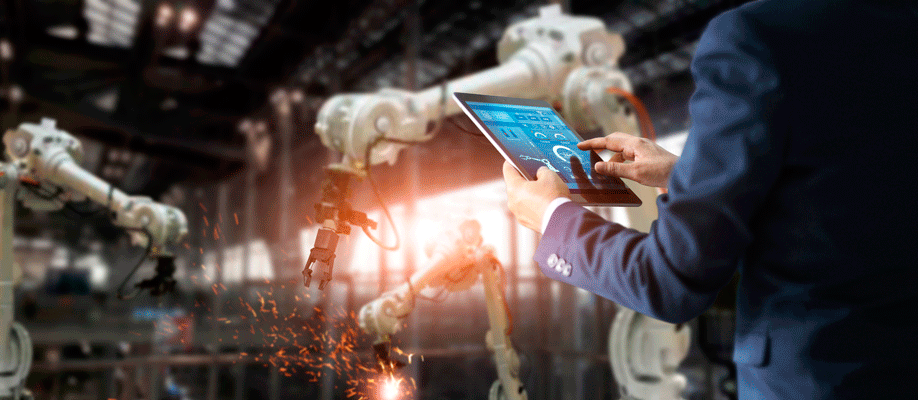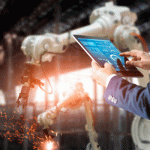LUIS ALEJANDRO NIETO AFANADOR
CO-FOUNDER AND COMMERCIAL MANAGER, 2NV
Note taken from Business Magazine.
See on the website.
Key technology to streamline the digital transformation strategy.
Robotic Process Automation or Automatic Process Robotization is a technology that addresses a clear vision of generating productivity through process automation.
Today, talking about digital transformation is essential when mentioning the importance of companies over time, because without this component, companies are exposed to innumerable challenges that are difficult to overcome. Hand in hand with digital transformation, RPA processes emerged as excellent allies. With the implementation of this technology, human resources have been optimized to the maximum, generating truly competitive and value-generating companies.
Digital Transformation in Companies
When we talk about digital transformation within companies, digital strategies that imply changes in the traditional way of operating within organizations must be addressed. Automatic Process Robotization came to change the traditional way of “doing things”, referring to the development of “Bots” that now perform repetitive and repetitive tasks or processes, reducing human intervention. 2NV, a company that participates in RPA implementations at Ecopetrol, invites Camilo Gutiérrez, leader of the RPA Factory, to tell us about his vision and advantages that this technology generates in the company:
“Our main objective is to ‘deroboticize’ our workers from those tasks that are highly manual and repetitive, in order to take advantage of their talents and skills in activities of value to the organization.”
“All this through automation solutions that generate optimizations in the business areas of Ecopetrol and the Business Group and thus increase operational efficiency on fronts such as quality, opportunity, productivity and costs.”
RPA- Key Piece of the Digital Transformation Strategy
For Ecopetrol, this transformation process with Automatic Process Robotization began approximately two years ago and today, together with its Business Group, it has more than 100 robotic units implemented through this technology. Gutiérrez tells us where they plan to go with RPA implementations in Ecopetrol and the Business Group:
“We hope to reach a much higher level of industrialization that will allow us to develop a large volume of solutions per year with a much shorter Time to Market than today. Most of the robots that we have developed have been for corporate areas such as Supply, Finance or Human Talent, as well as for areas such as Transportation, Commercial and Marketing”.
“The Roadmap to follow contemplates a much greater participation in the Core of the Company, such as Drilling, where we are already in the construction of two robotic units for the “discretization” in real time of the drills for each well, or in issues of Exploration, Development and Production”.
For this reason, the Automatic Robotization of Processes follows an evolution trend that achieves greater benefits and that allows the employees or workers of the companies to have their own automations. In them, they will be able to execute their use cases day by day, with now cognitive capabilities where, for example, they can recognize different types of documents, agile connections with different software platforms and hidden data in systems in order to extract them, understand them and be able to take fast and reliable decisions; which gives these companies a boost in efficiency and competitiveness in the market, thus achieving an accelerated digital transformation.
For Ecopetrol and other companies, RPA has been a key pillar in digital transformation, thanks to the agility in processes that have been implemented in the different business areas.
Robotic solutions are one of the many means and enablers that make Digital Transformation possible, which is based on three pillars that must be applied in our day-to-day operations: generating real value, innovating and transforming. With RPA solutions, it is expected that by 2023, Robotics will be the industrialized lever of the Virtual Operational Workforce that will deliver more than 400,000 man-hours of work to the entire Business Group, Gutiérrez describes.
Optimization with Artificial Intelligence
Automatic Process Robotization continues its path of evolution showing advances in terms of optimization and integration with new technologies such as artificial intelligence or machine learning. This will promote more efficient and, above all, faster automation solutions, giving positive results in less time, a measurable and optimal ROI or return on investment, an increase not only in customer satisfaction, but also in efficiency and productivity, reduction of errors, and high volume of transactions, which ultimately translates into more competitive companies.
For 2NV, a company specialized in technological services and solutions, RPA is defined as a key technology to speed up the digital transformation strategy in companies. Accompanying them on their way through methodologies that ensure success in these implementations is essential, as well as being able to identify the processes to be “robotized” in an agile way, carrying out a conceptualization process where development and implementation times are identified and, in turn, benefits that translate into ROI, optimization and savings for these companies.
At 2NV we transform your business by generating value based on innovation.





